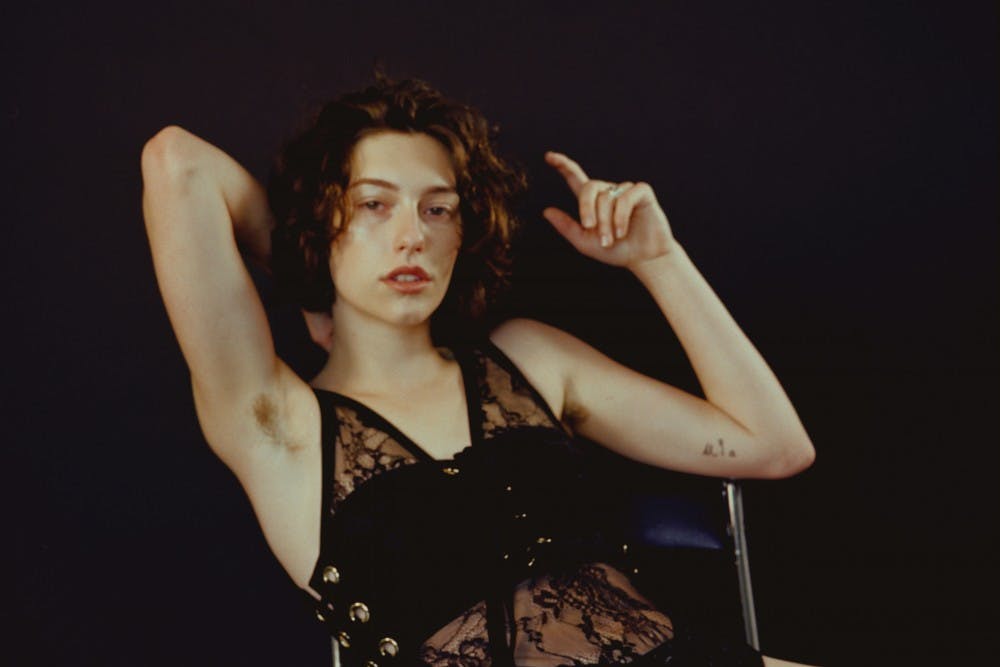While Billie Eilish may belong to teenage girls, King Princess belongs to those who are leaving those years behind. Mikaela Straus, professionally known as King Princess, is a 20–year–old NYC–based artist who captures the essence of the liminal space between teenhood and adulthood.
In 2018, King Princess released her breakout song, "1950" at the age of 19. The single is an ode to queer love and the LGBT community, and it forced Straus, who identifies as genderqueer and lesbian, into the spotlight.
After releasing a handful of singles and two EPs, Straus announced the release of Cheap Queen, a meticulously produced album given that Straus is the daughter of recording engineer Oliver H. Straus Jr. She spent most of her childhood in his Mission Sound studio, and over the years she learned a variety of instruments as well as music production techniques. This expertise is clear throughout the thirteen songs in Cheap Queen—there is not a single beat out of place.
The album as a whole tells a coherent story through its variety. In contrast to her previous EPs, Cheap Queen’s extended track list allows Straus to explore different styles and variations of her intrinsically sad ballads. In contrast to the distorted piano lullabies of “Isabel’s Memory” that underlie the lyrics, “hope is a thing you find when you’re sober,” the music–box–like melodies of “Watching My Phone” and head–bobbing drum beat of the album's title track capture the listener’s attention and build momentum to the climax. “Prophet” plays as if it has three unique movements—the second of which becomes ethereal and choral in contrast to the other two’s electric guitar line and bell–like synths.
In “Trust Nobody,” every note of each instrument is perfectly clear, and the experimental distortions and synth lines are all made with identifiable purpose and restraint. In “You Destroyed My Heart,” the cacophony of synth lines and instruments are indistinguishable from one another. They all blend together in the most satisfying way until all you can hear is the music. Combined with Straus’ clear and consistent vocals, the mix allows listeners to indulge in a trance–like state so peaceful that it's almost jarring when the song ends. In fact, a couple of the transitions between the songs are a bit sudden, halt the flow of the album, and force you to think about the creative process behind it.
In “Homegirl,” she sings on top of lilting guitar strums that are almost reminiscent of country music, but as Straus sings about a woman and how she “feels so safe in [her] arms,” there is a sense of reclamation in her words. With the characteristic frankness of a someone straddling the generational gap between Millennials and Gen–Z, Straus takes the genre and makes it her own for a new generation.
With the claim of “I can make grown men cry,” on title track “Cheap Queen”, Straus exudes the cockiness of an early twenty–something who feels likr she has the world in her hands. However, with, “she said meet me at the party, but I don’t know nobody,” (“Trust Nobody”), she also portrays the fragility of that confidence—a fragility with which anyone that age is familiar. In the final track, “If You Think It's Love,” Straus even includes the jaded devastation of someone realizing that “if this is love, I want my money back.”
Anyone standing in the dust that remains of their teenage years as they try to figure out what’s coming next should be no stranger to the mess of emotions in this album. They’re raw yet nostalgic. They’re vulnerable yet mature, in a way that almost makes you want to cry for a reason you don't understand. And the willingness to indulge in this strange mature uncertainty proves that King Princess is prepared to bare her soul and let that art evolve alongside her through a long and successful career.

